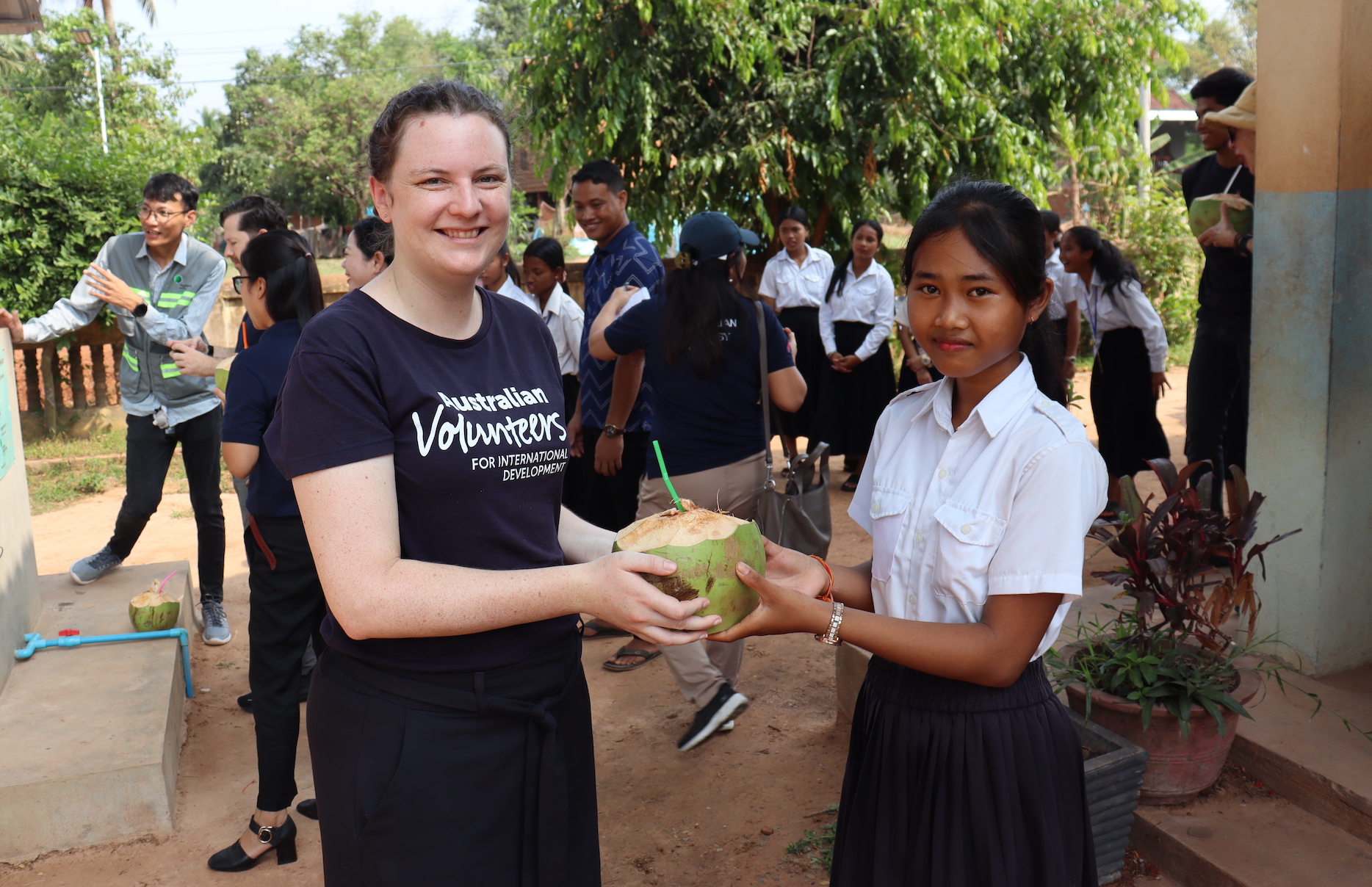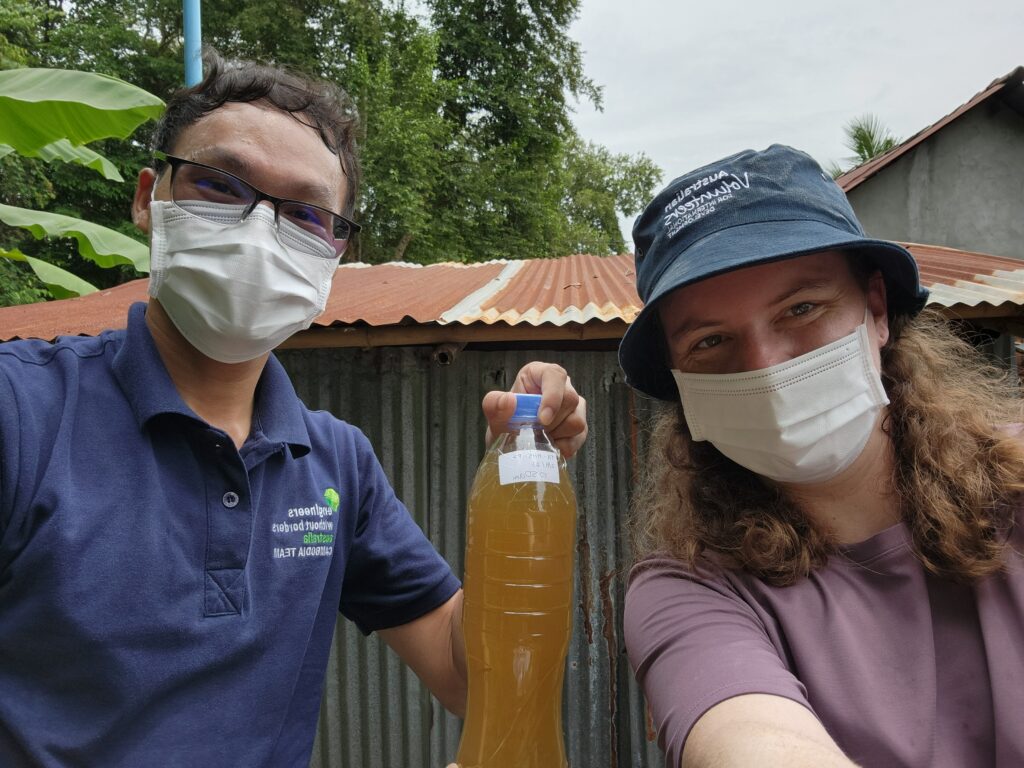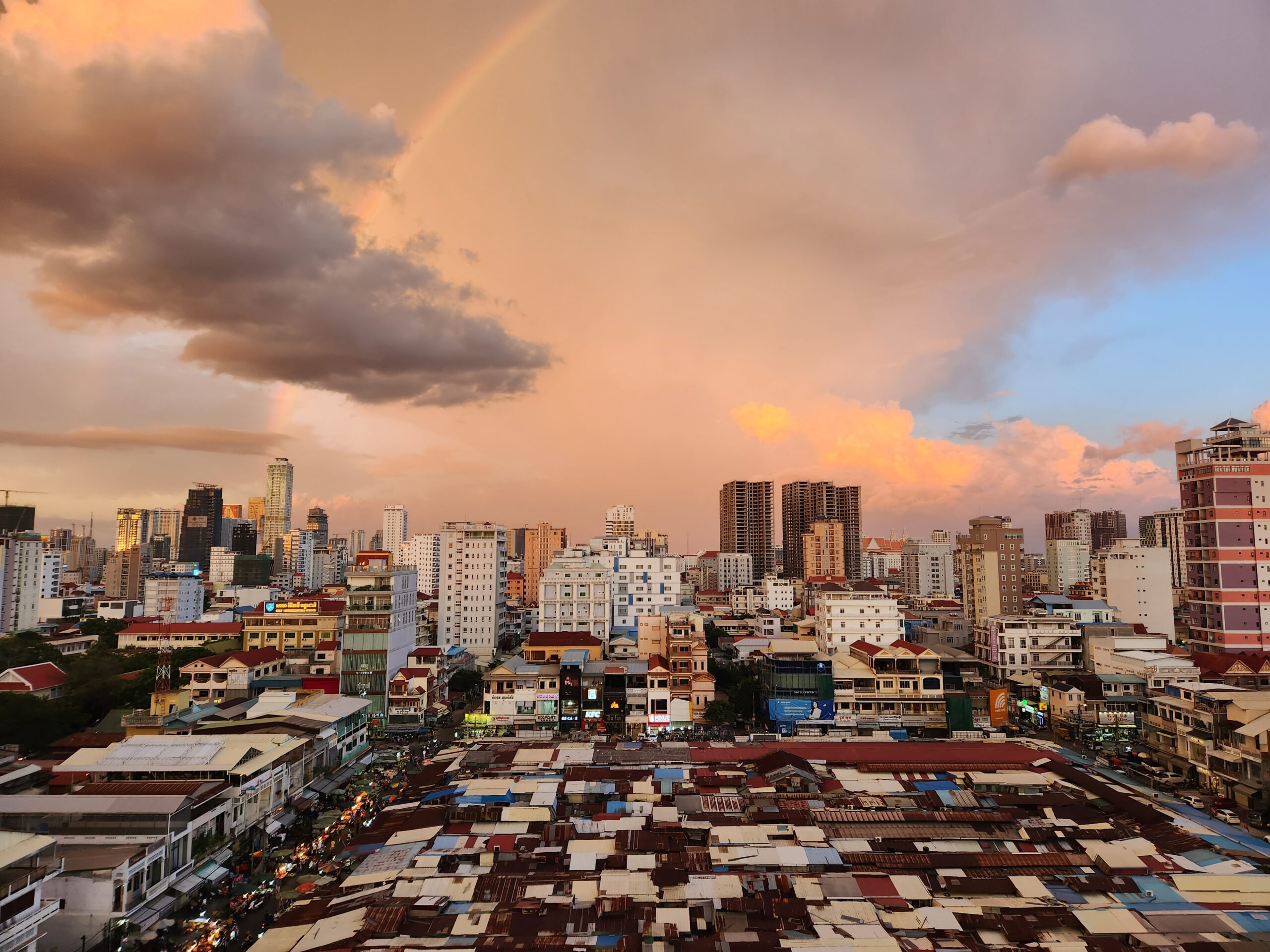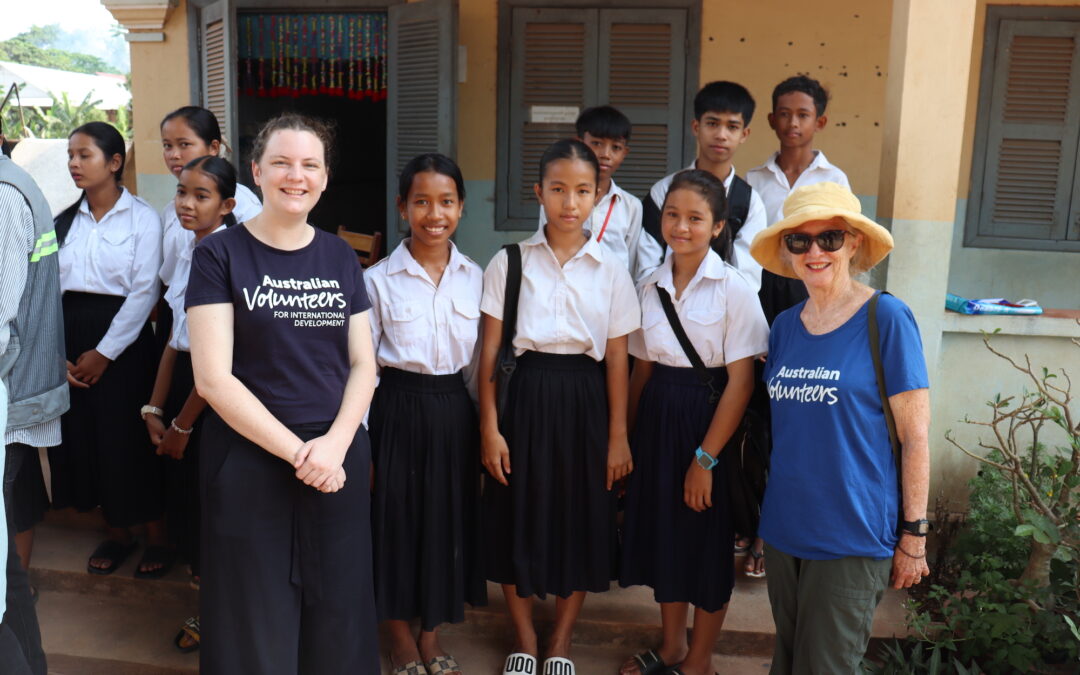Caption: Australian Volunteers Program Field Professionals, Nicole and Bea, visiting a school in Siem Reap where an accessible handwashing station was installed by EWB in partnership with CRST.
Water, risk, and sustainability engineer Nicole Locke had always wanted to work overseas but there had never been a good time to do it. She graduated into a difficult job market and was lucky enough to find a position with Water Corporation in Perth. Fast forward a few years to 2019 and Nicole was considering her next move.
“I was talking to a mentor and she said, you’ve always thought about going overseas and volunteering,” Nicole said. “’Why don’t you just do it?’ I thought—well, why not?”
For many technical professionals, once you’ve started down a career path it can be difficult to divert or pause the momentum. But taking time out from day-to-day work to learn something new is a tradition of learners the world over. The practice of sabbaticals, a period of time granted to pursue learning or projects outside of regular duties, was established by Harvard University in the 1880s and soon, it became common practice at all universities. It may be trickier these days to make a sabbatical work with modern life, but the benefits are still the same–new perspectives and new knowledge.
Nicole pursued her dream of volunteering overseas, a self-made sabbatical, by applying for an Australian Volunteers Program role with EWB Australia in the Cambodia office. “I called up someone from EWB because most of my engineering experience was more in strategy, not necessarily the hands-on technical detail and design that most people think engineering is all about,” Nicole said. “And they came back saying, no, actually we need that specific skill set.”In Perth, Nicole works in the water utility sector, a line of work that engenders a profound sense of responsibility. “Everybody needs [clean water], every single community needs it,” she said. “Most people in Australia can turn the tap on and they can take it for granted that they have what they need and that it’s going to be safe. And then moving into places like Cambodia, you no longer get to take that for granted.”

Nicole and a student during a visit to a school in Siem Reap.
Nicole’s first stint in Phnom Penh began in January of 2020. You can probably guess what happened next. Many Australian volunteers were repatriated home in March 2020 and the dream was put on hold – for a few years, at least.
Once the program started up again, she persevered and headed back to Cambodia at the end of 2022, this time with her partner in tow. Nicole had done a lot of travel over the years (fun fact: she’s visited every continent, including Antarctica!) but her partner was a little less sure. “I was comfortable, I knew what to expect [going back]. I knew how [the program] is so supportive and does a really good job introducing you to the country,” she said. The logistics of moving to a new country can be daunting but the Australian Volunteers Program has been doing this for a long time. Visas and insurance are included, you receive a living and accommodation stipend, there is support in finding affordable accommodation, and you’re entitled to receive language training. And best of all, according to Nicole, you’re inducted with a group of volunteers who are all in the same country. “It’s almost like, ‘Hey, here’s a support group, pre-made for you’,” she said.
So at the end of 2022, Nicole started again in Phnom Penh (second time’s the charm, in this case) as a WASH capacity mentor. “A capacity mentor is about mentoring individuals so that their technical and professional skills are increased,” Nicole said. “I think that’s a really rewarding way to work because it’s much more sustainable. Some organisations will think volunteers are just consultants. You come in, you do your project and you leave. But [when I leave] I’m leaving all the understanding and the knowledge in how to do this work.”

Assistive Technology Officer, Mengheang, and Nicole testing the quality of wastewater samples.
The role of a WASH capacity mentor asks you to jump into a variety of projects and lend your expertise in a sustainable way, contributing both to the outcomes of the project and upskilling your team members equally. For Nicole, the work she collaborated on was varied, from practical solutions and prototyping (“People might bring pipes and gears and all sorts of bits and pieces to the office to build pilot technology,” she said) to whiteboard brainstorming and strategy. Being placed in the Cambodian capital meant she and the other engineers were often able to go out into the field and get direct feedback from the community. EWB works with several rural and remote Cambodian villages developing new sanitation technologies, so travel to these places is often an adventure in itself – think tuk-tuk to bus to car to boat and back again.
Other elements of culture shock can creep into volunteer life too. Coming from the Australian context, international volunteers often discover an entirely different set of parameters in their new roles. From differences in office hierarchies, culture or language barriers, and complex field issues of access and resources, volunteering can be as challenging as it is rewarding. “It is a very difficult environment to work in sometimes,” Nicole said. “It takes a lot of time to find your feet and it requires a lot of support from local or experienced people, but there’s no point beating yourself up about it.”
What does a day in the life look like for an EWB engineer? It’s very different to living and working in Australia, although it starts out much the same.
“I would wake up, get ready, go down the elevator,” Nicole said. “I was living in the city in an apartment, it actually overlooked the Russian market [Tuol Tompoung], pretty cool. Then I order a tuk on an app to get to the office – they have great apps, it’s basically Uber for tuk-tuks.”
“The day would be filled with whatever projects we were doing. I was mostly in the EWB office, but sometimes I might need to go to, say, the government’s workshops or meetings. After work, you could just jump on a tuk-tuk and within ten minutes get anywhere you wanted to go, and there are some really incredible places to eat.”

The view from Nicole’s apartment, overlooking Tuol Tompong (the Russian Market).
The benefits of living and working in Cambodia are too many to name but include: quick and easy access to South East Asia (“I went to South Korea for a week because they’ve got direct flights!”) and plentiful time outside of work to pursue other interests (Nicole is writing a sci-fi novel and completed some online writing courses while in Cambodia).
One last question for Nicole: what was the best meal you ate in Cambodia? “I really like Fish Amok. It’s this beautiful smooth curry that’s the national dish.”
Actually, you don’t need to go all the way to Cambodia to try fish amok – you can try it at Country Cobb Bakery in Melbourne, run by two Cambodian brothers. Their Khmer creation, the Fish Amok pie, won Australia’s best pie in 2023. If you’re yearning for a taste of adventure, why not try it in pie-form first.
Food aside, the advice Nicole would give to prospective volunteers is all about expectations. “I think a lot of people go into this sort of thing, assuming ‘I’m going to change the world’,” Nicole said. “I went to try and provide value, but I feel that maybe I got more out of it. Part of what attracted me to being an international volunteer was knowing that by throwing myself into a different cultural context, I would have to adapt and learn and discover different ways of doing things. And that personal growth was definitely one of the strongest draw points.”
If you’re interested in pursuing your own supported sabbatical, consider volunteering overseas as an Australian Volunteers Program Field Professional with EWB.


